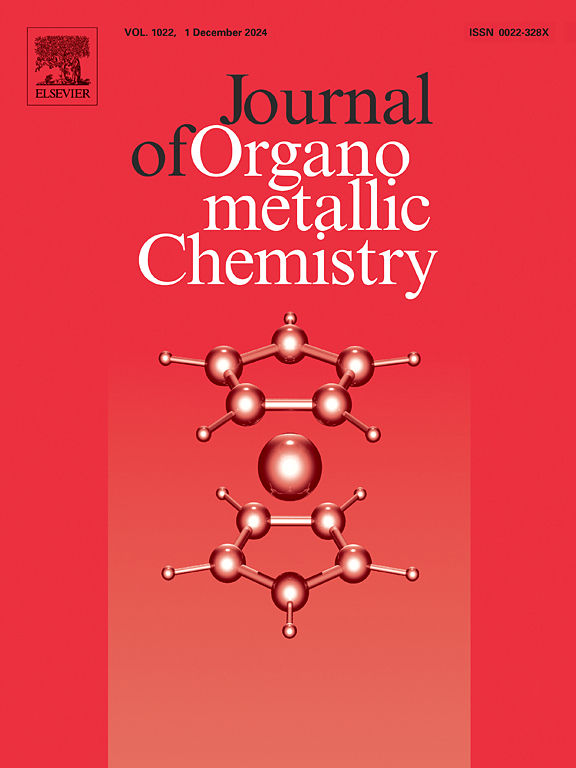有机磷化学中高氯苯基的保护作用
IF 2.1
3区 化学
Q3 CHEMISTRY, INORGANIC & NUCLEAR
引用次数: 0
摘要
带有笨重全氯苯基的同性膦 (C6Cl5)3P (1) 呈三叉金字塔结构 (TPY-3),但相当扁平:σ(c-p-c') = 321.0(1)°。我们通过计算估算了这种简单有机磷物种的主要立体和电子特性。根据其特征,1 可被定性为一种失活膦,其中碱性较低的 P 原子被体积较大的 C6Cl5 基团立体屏蔽。尽管存在这种明显的惰性,但(在苛刻的条件下)仍有可能获得磷处于高氧化态的衍生物,即氧化膦 (C6Cl5)3PO (2) 和二氟磷烷 (C6Cl5)3PF2 (3)。这些四代和五代衍生物分别呈现出三叉金字塔(TPY-4)和三叉双金字塔(TBPY-5)结构。根据所述的结构变化,Σ(C-P-C')值沿着 1-3 系列稳步上升。反过来,无论氧化态如何变化,P 原子周围取代基的数量和整体几何形状如何增加,P-C 键的长度始终保持在 185 pm 左右。高价二氟磷烷 (C6Cl5)3PF2 (3) 在气相中会解离出一个轴向氟化物,从而产生氟鏻阳离子 [(C6Cl5)3PF]+,质谱法检测到了这一阳离子。这种阳离子被认定为路易斯超酸。本文章由计算机程序翻译,如有差异,请以英文原文为准。

Protective effect of the perchlorophenyl group in organophosphorus chemistry
The homoleptic phosphine with the bulky perchlorophenyl group, (C6Cl5)3P (1), exhibits trigonal pyramidal structure (TPY-3), yet considerably flattened: Σ(C–P–C') = 321.0(1)°. Key steric and electronic properties of this simple organophosphorus species have been estimated by calculation. Attending to its characteristic features, 1 can be rated as a deactivated phosphine, where the less-basic P atom is sterically shielded by the bulky C6Cl5 groups. This marked inertness notwithstanding, it has been possible to obtain (under harsh conditions) derivatives with phosphorus in high oxidation state, namely the phosphine oxide (C6Cl5)3PO (2) and the difluorophosphorane (C6Cl5)3PF2 (3). These four- and five-substituted derivatives respectively exhibit trigonal pyramidal (TPY-4) and trigonal bipyramidal (TBPY-5) structures. The Σ(C–P–C') value steadily increases along the series 1–3, according to the referred structural variation. The P–C bond length is, in turn, invariably maintained at about 185 pm regardless of the different oxidation state, the increasing number of substituents around the P atom and the overall geometry. The hypervalent difluorophosphorane (C6Cl5)3PF2 (3) dissociates one of the axial fluorides in the gas phase giving rise to the fluorophosphonium cation [(C6Cl5)3PF]+, as detected by mass spectrometry. This cation is identified as a Lewis superacid.
求助全文
通过发布文献求助,成功后即可免费获取论文全文。
去求助
来源期刊

Journal of Organometallic Chemistry
化学-无机化学与核化学
CiteScore
4.40
自引率
8.70%
发文量
221
审稿时长
36 days
期刊介绍:
The Journal of Organometallic Chemistry targets original papers dealing with theoretical aspects, structural chemistry, synthesis, physical and chemical properties (including reaction mechanisms), and practical applications of organometallic compounds.
Organometallic compounds are defined as compounds that contain metal - carbon bonds. The term metal includes all alkali and alkaline earth metals, all transition metals and the lanthanides and actinides in the Periodic Table. Metalloids including the elements in Group 13 and the heavier members of the Groups 14 - 16 are also included. The term chemistry includes syntheses, characterizations and reaction chemistry of all such compounds. Research reports based on use of organometallic complexes in bioorganometallic chemistry, medicine, material sciences, homogeneous catalysis and energy conversion are also welcome.
The scope of the journal has been enlarged to encompass important research on organometallic complexes in bioorganometallic chemistry and material sciences, and of heavier main group elements in organometallic chemistry. The journal also publishes review articles, short communications and notes.
 求助内容:
求助内容: 应助结果提醒方式:
应助结果提醒方式:


